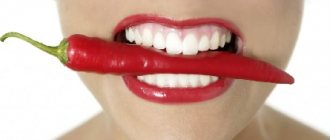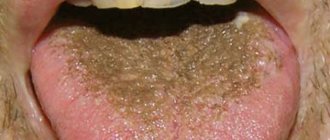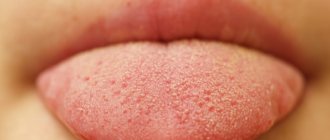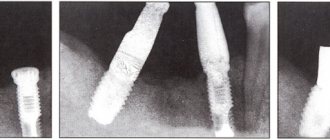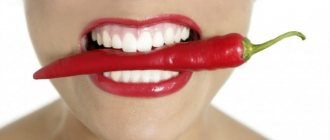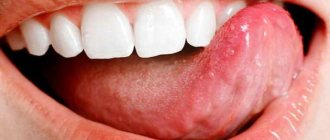Bitterness in the mouth is a common symptom of various diseases of the digestive tract. It can be observed only occasionally after drinking alcohol or fried and fatty foods, or it can appear constantly - in this case it is necessary to undergo a full examination and determine the cause of the pathology. What can cause bitterness in the mouth, and what additional symptoms can it be accompanied by?
The most common causes of bitterness in the mouth
The cause of bitterness in the mouth is the ingress of large amounts of bile.
The main reason for the appearance of a bitter taste in the mouth is the entry of a large amount of bile into the gastrointestinal tract.
This is a secretion that is produced by the liver and is used when digesting food; normally, bile flows through the bile ducts into the duodenum.
Some foods, such as pine nuts, and medications have a choleretic effect, so they promote the production of increased amounts of bile. If it penetrates the esophagus and stomach, there is a feeling of bitterness in the mouth.
Bitterness is a sign of trouble in the digestive system; most often it appears after eating fatty, fried and other hard-to-digest foods. Normally, it should not enter the esophagus; digestive disorders occur for several common reasons:
- Digestive disorders. Usually, bitterness in the mouth is associated with stagnation of bile, in this case it is accompanied by the appearance of a yellow coating on the tongue, a metallic taste, and the urine becomes dark. An additional sign of liver dysfunction is yellowness of the skin.
- Gastroesophageal reflux disease is a disorder of the stomach in which its contents begin to leak into the esophagus. The disease is accompanied by heartburn, nausea, belching after eating, and chest pain.
- Infestation with parasites. Parasitic infestations lead to numerous disorders of the digestive tract: intestinal function is disrupted, and signs of vitamin deficiency often appear. If a parasite infestation is detected, the doctor will prescribe special anthelmintics.
- Biliary dyskinesia caused by hormonal disorders. Disruption of the thyroid gland provokes spasm of the biliary tract, resulting in a feeling of bitterness in the mouth.
- Another hormonal disorder that can provoke this unpleasant symptom is diabetes.
- A short-term feeling of bitterness in the mouth can occur after taking antibiotics due to increased load on the liver; sometimes this feeling occurs after consuming pine nuts, medications, and often occurs during pregnancy.
Treatment and elimination of symptoms
A set of therapeutic measures is selected depending on the pathology after diagnostic procedures .
It is worth noting! The goal of treatment is not only to eliminate the symptom itself. First of all, it is important to get rid of the pathology that caused the taste of eggs in the mouth.
Medications
As for medications , the following drugs are used depending on the disease:
- for dysbiosis, medications from the class of probiotics are used , for example, such as Hilak Forte and Linex;
- in situations with constipation, laxatives are used (they must be prescribed by a doctor), as well as enemas with olive or vaseline oil ;
- if the cause of bad breath is a lack of digestive enzymes Mezim Forte and Festal are taken ;
- the process of producing bile in the body , then Allochol or Holosas ;
- for stomach ulcers or gastritis, Almagel and analogues are used ;
- if there is a bacterial infection , then you will need to take a course of Amoxicillin and Phthalazol ;
- if there are parasites use Levamisole, Metronidazole and other similar drugs.
Important! Under no circumstances should you self-medicate if you have a smell of rotten eggs coming from your mouth. Medicines are prescribed only by a doctor after proper diagnosis.
Diet
It happens that the taste of rotten eggs in the mouth appears due to food poisoning. In such a situation, to get rid of the symptom you will need to do a gastric lavage.
In order to provoke a gag reflex, you can prepare a weak solution of soda and drink it in small sips.
After gastric lavage, you need to take any sorbent.
As for directly eliminating the symptom , you can get rid of it yourself at home.
First of all , you should pay attention to the daily menu and adjust your diet. Low acidity is eliminated by consuming :
- fermented milk products;
- meat;
- fish;
- vegetables You can make a beet or turnip salad.
Keep in mind! To eliminate the symptom, you need to exclude the following foods from your diet:
- alcoholic products;
- citrus;
- plums, cherries;
- legumes;
- milk products;
- cabbage, squash, zucchini;
- bread.
When the smell of rotten eggs appears in the mouth, eat food 5 times a day in small portions. strictly not recommended to fast for “accumulation of acid”, as well as to overeat.
Folk recipes
You should know! At home, you can use the following methods to get rid of the smell of rotten eggs from your mouth:
- herbal decoctions (melissa, chamomile, yarrow). Infusions of raspberry leaves, rosehip or sea buckthorn, as well as St. John's wort and lingonberry, give a good effect. These herbs can be purchased at the pharmacy and prepared according to the attached instructions, or 1/2 teaspoon of herbal raw materials, pour 300 ml of boiling water and leave for 15 minutes;
- take general strengthening agents, for example, vitamin-mineral complexes . It is useful in such a situation to drink mineral water;
- soda solution. To quickly get rid of an uncomfortable symptom, you will need to prepare a weak soda solution. Dilute 1/2 teaspoon of the substance in 250 ml of water and drink in small quantities when hydrogen sulfide belching occurs;
- eggshell. For this remedy, you will need to boil the eggs for 20 minutes, peel them, remove the film from the shell and grind the shell into powder. Take 1/2 teaspoon three times a day. The product should be washed down with clean water;
- mint tincture. The product can be purchased at a pharmacy and taken 15-20 drops with meals.
Plaque in the mouth and bitterness as signs of disease
Bitterness in the mouth can be a sign of gastritis and peptic ulcers.
During the examination at the appointment, the doctor will definitely ask the patient to show his tongue: based on plaque, if it is combined with a feeling of bitterness in the mouth and abdominal pain, the doctor will receive more accurate information about the existing pathology.
For various diseases of the digestive system, the following clinical picture may be observed:
- A variation of the norm is the appearance of white plaque, which can be easily removed with a toothbrush. It usually indicates an excess amount of sugary foods in the diet and an increased amount of bacteria in the mouth. However, he speaks of the absence of serious pathologies in the digestive process.
- A feeling of bitterness combined with the appearance of a dense white-gray plaque is a sign of gastritis and gastric ulcer; such plaque often accompanies heartburn. A characteristic sign is the absence of plaque on the tip of the tongue.
- If a dense white coating accumulates at the base of the tongue, it usually indicates chronic gastritis. It is often accompanied by bloating, constant heartburn, and a bitter taste in the mouth.
- If there is a yellow coating with a greenish tint, this is clear evidence of liver pathology and gallbladder function. This is an alarming sign and the patient needs immediate medical attention.
A coating on the tongue also often appears in smokers; it also occurs along with an unpleasant taste in the mouth after drinking alcoholic beverages.
If unpleasant sensations occur systematically, it is necessary to consult a therapist for examination: the doctor will refer the patient to a gastroenterologist and endocrinologist, after which appropriate treatment will be selected.
Treatment for burning sensation in the mouth
First of all, you need to find out the cause of the burning sensation in the mouth. If the problem is related to diseases and conditions of the oral cavity and teeth, then in the dental clinic the patient is given one or more of the following measures:
- Professional teeth cleaning – removal of plaque, stone, sanitation of the oral cavity.
- Treatment of dental diseases - caries, pulpitis.
- Treatment of gum diseases – gingivitis, periodontitis.
- Assessment of the condition of dentures and their effect on the oral mucosa. If necessary, prosthetic structures are replaced.
In addition to the above procedures, therapeutic measures for burning in the mouth also include taking anti-inflammatory, antibacterial or antifungal (for candidiasis) drugs. If there is a lack of vitamins and minerals, a course is prescribed to replenish the missing biologically active substances. Some patients are prescribed physical therapy.
Methods for treating bitterness in the mouth
To treat this disease, you can use freshly squeezed juices.
In all cases, treatment of bitterness in the mouth should begin with a visit to a specialist and a comprehensive examination.
This symptom indicates various pathologies in the body, so it is important to accurately determine the cause of the disorders so that the treatment is effective.
In almost all cases, the success of treatment largely depends on the efforts of the patient himself. First of all, you will need to adjust your diet: you will need to exclude any hard-to-digest food and alcoholic drinks from your diet, and you will need to follow a diet.
Compliance with the diet also requires stopping smoking and consuming any substances that can irritate the mucous membranes. In addition to the medications that the doctor will prescribe to treat the identified disease, it will be useful to use the following folk remedies:
- Constantly drinking plenty of fluids helps improve the functioning of the digestive system. You need to drink at least 2-2.5 liters of water per day; in addition, drinking rosehip or currant decoction is beneficial.
- Drinking freshly squeezed vegetable and fruit juices - carrot, orange, apple, etc.
- Natural juices help improve appetite, provoke salivation, and in addition, the body receives a sufficient amount of vitamins.
- Use of sedatives. Many digestive disorders occur against the background of a constant remedy, so the use of sedatives will be required. This is an infusion of valerian, motherwort decoctions, and also the use of sedative tea.
- It is also necessary to normalize the functioning of the intestines: for this it is necessary to consume sorbents, as well as foods rich in fiber to get rid of constipation.
It is important to remember that bitterness in the mouth is not an independent disease, but only one of the alarming signs that requires mandatory diagnosis and correction of the diet. Only with an integrated approach will treatment be successful and avoid possible complications.
Other symptoms
It is worth noting! In addition to the immediate manifestation in the form of the smell of eggs from the mouth, the patient may experience the following list of symptoms:
- the appearance of nausea and heaviness in the stomach ;
- bloating ;
- the phenomenon of constipation or diarrhea ;
- bouts of vomiting ;
- pronounced pain in the stomach ;
- feeling of fullness in the stomach.
Depending on the accompanying symptoms, it is possible to identify the pathology developing in the body.
What complications does bitterness in the mouth lead to?
Bitterness in the mouth may indicate serious inflammatory processes in the digestive tract.
If you ignore an alarming sign, you may soon encounter very unpleasant consequences of the development of pathology.
Bitterness in the mouth may indicate serious inflammatory processes in the digestive tract: cholecystitis, gastritis, pancreatitis, etc.
Lack of timely treatment leads to the fact that the disease becomes chronic, and it becomes much more difficult to cope with it.
A constant bitter taste leads to loss of appetite, which results in weight loss to the point of exhaustion. Eating habits change; over time, a person may almost completely lose the ability to taste food. All this, in combination with other symptoms of the disease, leads to the development of depression and a general deterioration in well-being.
Diagnostic measures
Before starting a course of treatment and getting rid of an unpleasant symptom, you need to undergo a diagnosis.
Keep in mind! The set of diagnostic measures includes the following:
- General and biochemical blood test. With its help, the presence or absence of an inflammatory process in organs and tissues is revealed, and internal bleeding is excluded;
- stool analysis. Determine the presence of parasites and intestinal infections in the body;
- Ultrasound. During the examination, the structure and size of the internal organs are visible, which makes it possible to determine deviations;
- determination of the acidity of gastric juice. The probing method is used for research, in which secretions are taken or the PH metric method;
- fibrogastroduodenoscopy. The method is aimed at identifying more detailed information about the quality indicators of the mucous membrane of the stomach and intestines;
- CT.
